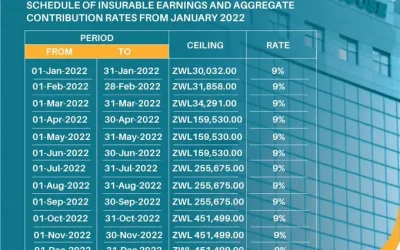2024 National Budget Highlights-Zimbabwe
Finance, Economic Development and Investment Promotion Minister Mthuli Ncube on 30 November 2023 proposed a ZW$58.2 trln National Budget for 2024 giving priority to, among other things, the need to maintain the purchasing power of civil service salaries, sustaining maintenance and rehabilitation of government infrastructure and support to on-going public infrastructure projects.
Key Tax measures in 2024 Budget
Major Tax highlights from the draft Finance Bill includes the following proposals;
Value Added Tax
- VAT Registration Threshold– proposal to review downwards, the VAT registration threshold from US$40 000 to US$25 000 or local currency equivalent with effect from 1 January 2024.
- VAT Fiscalisation – Proposal to regulate fees charged by approved suppliers on the supply, support and maintenance of fiscal devices.
- Offenses and Penalties on non VAT Fiscalisation- The minister is proposing to levy heavy penalties on failure to comply with Interface requirements, Tampering with Electronic Fiscal Devices, Failure to demand Fiscal Invoice or Receipt.
- Features of Fiscal Tax Invoices-proposed to replace the VAT Registration Number and Business Partner Number with Tax Identification Number, as well as provide for features that include electronic signatures, authentication codes and quick response codes for verification of the Fiscal Tax Invoices.
- Amendment of Time of supply on Value Added Tax on Imported Services– Time of supply be deemed to take place
- at the time an invoice is issued by the supplier or the recipient in respect of that supply; or
- the time any payment of consideration is received by the supplier in respect of that supply; or
- the time the service is performed, whichever time is earlier.
- Revise the legislation on Prescribed Amount when Invoice Issuance –
- The legislation requires that fiscal tax invoices be issued within 30 days from date of supply, where the prescribed amount to which an invoice can be issued is pegged at US$10.
- Proposal that every operator be required to issue an invoice when a supply is made and to remove the requirement to issue an invoice/ receipt within 30 days after the time of supply.
- All transactions will be issued with a fiscal invoice at the time of supply.
- Deferment of Value Added Tax – Proposal of deferment of VAT to commencement of production, up to a maximum of 2 and 3 years, for operators in manufacturing and mining, respectively, subject to approval by the Minister responsible for Finance.
- VAT Zero Ratings and Exemptions – In order to widen the VAT collection nets, the minister is proposing
- Limit VAT zero ratings to exports, in line with the Destination Principle of Value Added Tax, where goods and services are liable to tax in the jurisdiction in which they are consumed.
- Limit VAT exemptions to medicines and medical services, goods for use by the physically challenged, sanitary wear, fuel & fuel products, agricultural inputs, implements & produce (excluding live animals, groundnuts, cotton seed, soya beans and products thereof), wheat (excluding bread), milk and salt. The exemptions will apply through the entire value chain.
- The remaining goods and services would, thus, be standard rated.
- Exportation of un-beneficiated lithium – Proposal to amend the Value Added Tax Act section 12B. The Minister proposed to increase the tax rate on the exportation of un-beneficiated lithium from 5% to 6%.
- Exportation of uncut and cut dimensional stone – Amend section 12E. Proposal to increase the tax rate on the exportation of uncut and cut dimensional stone from 5% to 6%.
Corporate Income Tax
- Revise Corporate Income Tax Rate up – Proposal to increase Corporate Income Tax Rate of from 24% to 25%.
- Domestic Minimum Top-Up Tax – Proposal to introduce DMTT rules to guard against ceding taxing rights to foreign jurisdictions on Top-Up Tax arising from tax incentives.
- Licensing of Traders – Proposal that only licensed and Tax Compliant Operators procure goods from manufacturers and wholesalers.
- The Minister further proposed that only traders registered for VAT purposes and in possession of valid Tax Clearance Certificates be eligible to procure goods from manufacturers.
- Domestic Minimum Top-Up Tax– Proposal to introduce DMTT rules to guard against ceding taxing rights to foreign jurisdictions on Top-Up Tax arising from tax incentives.
- Levy of Sugar Tax – Proposal to a levy of Sugar tax on beverages that contain sugar which will be charged at 2c per gram of sugar in the beverage.
- Wealth Tax – Proposal to introduce a wealth tax of 1% of value of residential property above US$100,000, however with an exemption applicable to individuals above 70 years.
Capital Gains Tax
- The Minister proposed that no transfer of mining rights shall be approved without payment of Capital Gains Tax and Stamp Duty or any other tax due on the value of the transaction.
- Failure to abide by this condition shall render the disposal or lease of mining rights null and void.
- The Minister proposed that all documents or agreements for transfer or disposal or lease of mineral rights be lodged with the State for review and approval before the transaction is concluded.
- Proposal to exempt from Capital Gains Tax the amounts received by or accruing to commercial farmers whose land was acquired under the Land Reform Programme.
- 20% CGT of the proceeds on transfer of a mining title is now chargeable on any mining title where such mining title was transferred within a 10-year period before 1 January 2024 and is disposed of after 1 January 2024.
Withholding Taxes
- Proposal to review all monetary amounts and taxes stated in local currency in the Taxes Acts to be denominated in foreign currency, even though, payable in local currency at the prevailing exchange rate.
- Revising withholding tax exemption threshold for delivery of grain to GMB is set at US$5,000.
Discalaimer-The information contained herein is of a general nature and is not intended to address the circumstances of any particular individual or entity. Although we endeavour to provide accurate and timely information, there can be no guarantee that such information is accurate as of the date it is received or that it will continue to be accurate in the future.
No-one should act on such information without appropriate professional advice after a thorough examination of the particular situation.


